by Matthew Pook
 Title: The Last Dance
Title: The Last Dance
Publisher: Atlas Games
Written by Chris Aylott
Illustrated by David Interdonato
Price: $9.95
40-page saddle stitched soft cover
A simple journey along a forest road at the height of Midsummer is
broken by an encounter with a man imploring the adventurers for their
aid. Unfortunately, he seems to be having some difficulty communicating
with the party. Not only is he dead, but someone has also cut his
throat and larynx! Which leaves gesture, which he seems to be capable
enough at. So that leaves the questions of what sort of help he is
after, and why does he want the adventurers to dance?
Thus opens The Last Dance, Chris Aylott's latest book from Atlas Games. After allowing us to run rampage
with the Rune RPG adventure Crouching Wizard, Smashing Hammer, Aylott takes a different tack for this d20 System adventure. The Last
Dance, written for four to six characters of fourth to sixth level, gives
players the chance to solve an ancient mystery, stop an act of treachery and gain
the favour of a King. And all they have to do is dance the night
away... well, that and a little more.
Physically, The Last Dance is near faultless and up to the usual
standard of presentation we see in the Penumbra titles. The choice of a
very pale ochre hue as its additional color gives the book a very
light feel, much in keeping with the mood and setting. David
Interdonato's art adds to this, and while his style may not be to
everyone's liking with the overly pointed features of his figure work,
it again suits this adventure, adding to the slight alien quality of
the situation.
Another nice touch is the fiction that opens each chapter of the adventure. Not
only is it well written, but it also relates the experiences of several
adventurers as they investigate the situation. The referee should be able to gain
a greater feel for the adventure as he reads each of these pieces and hopefully
use this insight when he runs it for his players.
A minor annoyance is the book's use of space, particularly the fact
that the final two pages consist of advertisements for other Atlas Games books.
Not that I necessarily object to these out of any principle, but since the
adventure does revolve around an albeit limited temporal loop, I think that one
of these pages could have been given over to some kind of flow chart or table
enabling the referee to keep close track of the adventure's events with greater
ease. The mystery and time loop are still explained more than adequately, but a visual aid would be helpful.
The Last Dance opens with the party heading down the road, instantly
allowing
this to be inserted into most campaigns. A beggar -- who turns out to
be dead and has his throat cut -- implores them for their help. Once
sure of the party's good intentions (that is, they are not just going
to hack at him), he attempts to teach them a few dance steps.
Yes, I said dance steps. As incongruous as that may seem, learning
these dance steps are essential to solving a mystery and righting a
wrong -- and thus completing the adventure. Long ago, King Milleas of
Dayvos attempted to forge a peace treaty with the Orcish tribes his
kingdom had been fighting for years. The pact would be sealed through
the marriage of the Kingís daughter to the son of the Orc chief, but on
the night of the signing, an act of treachery and a spell gone awry
caused the death of all involved and the endless repetition that night'ís
events. The tragedy cut down the nobility of the kingdom of
Dayvos and caused its fall into obscurity.
The beggar, an under-jester named Frog who served at the King'ís cour, discovered
the plan as it was about to be enacted, but was slain before he could
get out a warning. Frog will lead the party into the woods and through
a strange mist to the very frontier fort where the treaty is once again to
be signed that very night! Inside the fort, the
party will find that the peoples of long ago were majestic, taller and
nobler than those of their own time. Not only that, but in the great
hall everyone -- both Orcs and nobles, seem to be dead. Some have died
from the obvious sword and axe blows, but others appear to have died
from exhaustion. If the characters should enter the Great Hall, music
starts anew and everyone, including themselves will fall under the
strongest of compulsions to dance. Good thing that Frog taught them a
few dance moves.
Getting out of this strange compulsion lies at the heart of The Last
Dance, and actually dancing is the key. This is not an adventure
suited
to clod-hopping Thrug the Mighty with his two left feet; in fact, the
Dance
skill is almost a must (giving an advantage to Bards). Suggested dice
rolls are given for solving this
problem, but experience points should really only be awarded for
escaping the dance if the
players work out the solution for themselves.
Once out of the dance, the party can begin to explore the
fort itself. This is when another problem surfaces: as
none of them speak the language of the kingdom of Dayvos, interacting with the inhabitants of the fort will prove rather
difficult. Despite the added hurdles, characters must explore the fort,
until they gather enough information to return to the
great hall and stop history from repeating. The act of treachery that
doomed the kingdom the first time is about to happen again, and the
traitors will more than likely be aware of the party's intention to interfere.
Another
tough dance around the floor -- this time in the midst of
combat and a race against time -- stands between the characters and
success. If they fail, then they will find themselves joining the
danse macabre.
Of course, The Last Dance is not the first scenario to offer this
kind of mystery for the players to solve. For example, it is reminiscent of
the Mobius Tower section found in the AD&D 2nd Edition adventure
I5: Lost Tomb of Martek. But The Last Dance is far more enjoyable by comparison, carrying a high-spirited tone
throughout.
This adventure is not for those that prefer dishing out
slaughter over solving a conundrum or two. Nor is it a very long
adventure, perhaps providing just a second evening's play at a stretch.
The book provides a few new magical items (a Torc of Missile
Deflection and the dangerous Moonstone artifact) plus a new
monster (the Manavore), further allowing The Last Dance to stand on
its own. The prevention of the fall of the kingdom of Dayvos will no
doubt have some effect upon the timeline of the referee's setting, but
what this may be is really left up to the referee to decide. Exploring
these effects might provide the referee with an excuse to use the time-travelling clergy from Atlas' other d20 System
adventure, The Tide of Years.
The Last Dance is an excellent and well written mystery of manners that will
provide the players with an interesting challenge.
The
author would like to thank Roj at Wayland's Forge for his assistance




